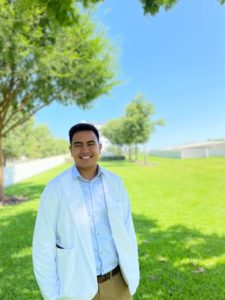Remote Area Medical clinic gives HSC physician assistant studies student the confidence he needs for his first clinical rotation
 This past December, The University of North Texas Health Science Center at Fort Worth partnered with Remote Area Medical — for the second time — to bring free health care to the underserved and uninsured population in Texas.
This past December, The University of North Texas Health Science Center at Fort Worth partnered with Remote Area Medical — for the second time — to bring free health care to the underserved and uninsured population in Texas.
The impact of this clinic reverberated throughout North Texas and beyond. Last year alone, 623 volunteers served 538 patients and provided $2.1 million in services. The RAM clinic is not only life-changing for the community, but also for the student volunteers.
For some students serving as medical volunteers, RAM was their first time interacting with patients. Students in their first or second year of school haven’t reached their clinical rotations yet.
This was true for Justin Chaves, a second-year physician assistant studies student and a student ambassador for the physician’s assistant program. Not only was this his first RAM experience as a medical provider, but the event also marked his first time encountering a real patient.
“I was incredibly nervous at first,” Chaves said. “I had not begun my clinical rotations yet, so this was my first real experience seeing actual patients as a PA student.”
For students like Chaves, taking what they have learned in the classroom and applying it to real-life scenarios can be incredibly nerve-wracking. Fortunately for Chaves and other students in his situation, practicing physicians and upper-level students were there to encourage him every step of the way.
“The environment was very conducive to developing my clinical skills due to the supportive clinicians on site,” he said. “I left with a lot more confidence in seeing patients than when I came.”
The students that served as medical volunteers were able to conduct the initial interviews and physical exams on patients, then they presented their findings to a preceptor and recommended treatment and lab tests based on the exam. The preceptor then met with the patient, presented the findings and answered any questions the patient had.
“Throughout RAM, I kept reminding myself that it is okay to stumble,” Chaves said. “The important thing is that you are trying, and you are learning. Each mistake is a learning opportunity that will make you a better clinician in the long term.”
Not only did RAM give him the confidence he needed to head into his clinical rotations, it also reminded him why he wanted to go to PA school to begin with.
“From a personal perspective, RAM was a way for me to remember my why,” he said. “After 18 months of lectures and exams, I was definitely feeling a little burnt out. RAM was a great refresher that I chose to go to PA school so I can help patients and serve my community.”



![Uyen Sa Nguyen Scaled[58]](https://www.unthsc.edu/newsroom/wp-content/uploads/sites/16/Uyen-Sa-Nguyen-scaled58-145x175.jpg)

Social media